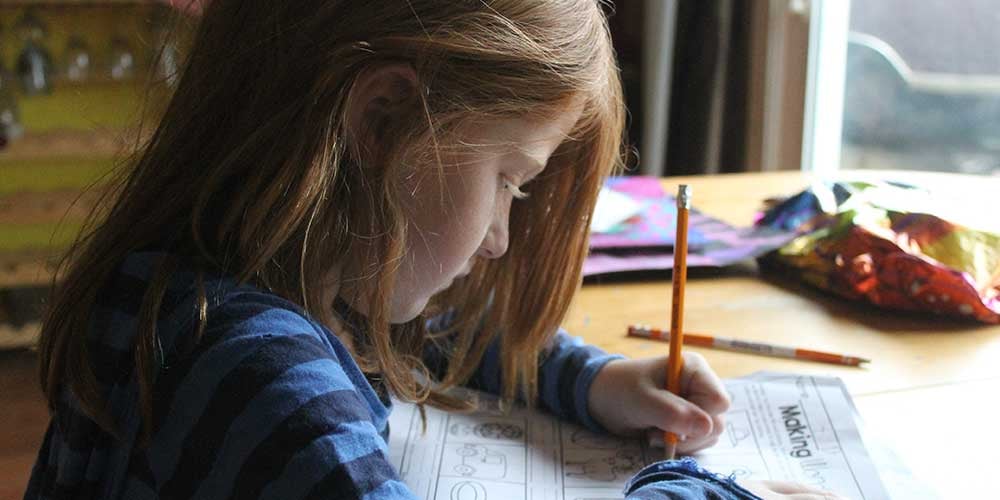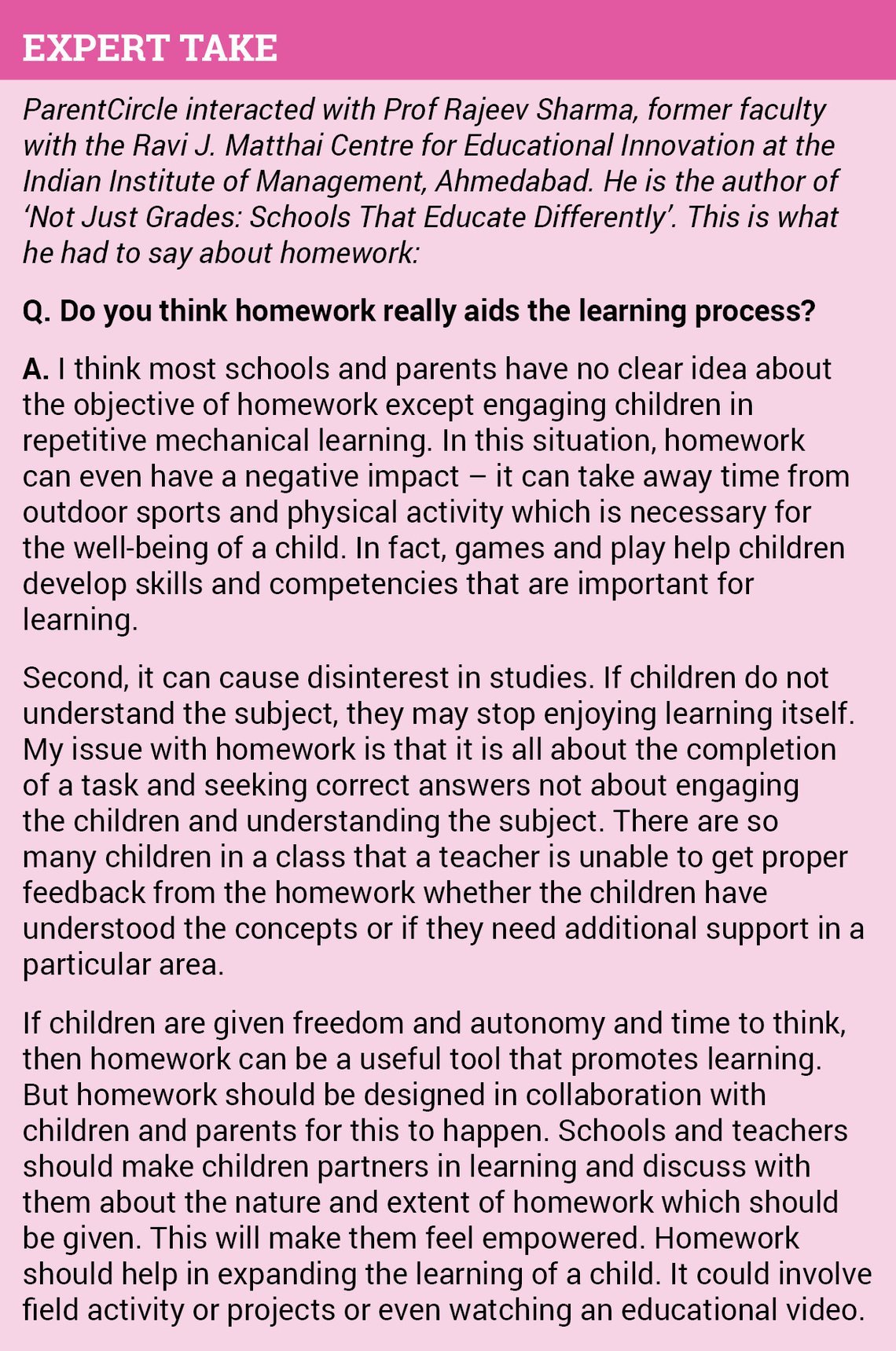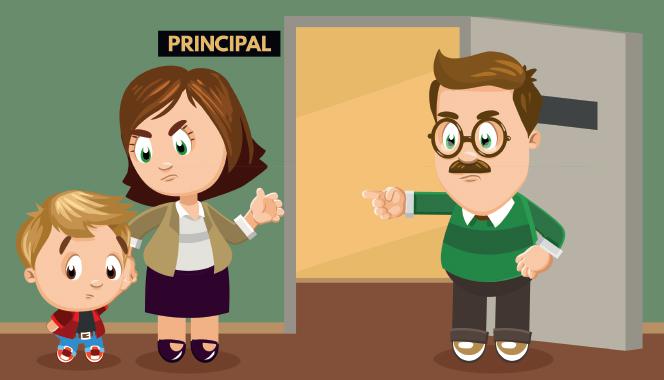Does Homework Really Help Students Learn?

A conversation with a Wheelock researcher, a BU student, and a fourth-grade teacher

“Quality homework is engaging and relevant to kids’ lives,” says Wheelock’s Janine Bempechat. “It gives them autonomy and engages them in the community and with their families. In some subjects, like math, worksheets can be very helpful. It has to do with the value of practicing over and over.” Photo by iStock/Glenn Cook Photography
Do your homework.
If only it were that simple.
Educators have debated the merits of homework since the late 19th century. In recent years, amid concerns of some parents and teachers that children are being stressed out by too much homework, things have only gotten more fraught.
“Homework is complicated,” says developmental psychologist Janine Bempechat, a Wheelock College of Education & Human Development clinical professor. The author of the essay “ The Case for (Quality) Homework—Why It Improves Learning and How Parents Can Help ” in the winter 2019 issue of Education Next , Bempechat has studied how the debate about homework is influencing teacher preparation, parent and student beliefs about learning, and school policies.
She worries especially about socioeconomically disadvantaged students from low-performing schools who, according to research by Bempechat and others, get little or no homework.
BU Today sat down with Bempechat and Erin Bruce (Wheelock’17,’18), a new fourth-grade teacher at a suburban Boston school, and future teacher freshman Emma Ardizzone (Wheelock) to talk about what quality homework looks like, how it can help children learn, and how schools can equip teachers to design it, evaluate it, and facilitate parents’ role in it.
BU Today: Parents and educators who are against homework in elementary school say there is no research definitively linking it to academic performance for kids in the early grades. You’ve said that they’re missing the point.
Bempechat : I think teachers assign homework in elementary school as a way to help kids develop skills they’ll need when they’re older—to begin to instill a sense of responsibility and to learn planning and organizational skills. That’s what I think is the greatest value of homework—in cultivating beliefs about learning and skills associated with academic success. If we greatly reduce or eliminate homework in elementary school, we deprive kids and parents of opportunities to instill these important learning habits and skills.
We do know that beginning in late middle school, and continuing through high school, there is a strong and positive correlation between homework completion and academic success.
That’s what I think is the greatest value of homework—in cultivating beliefs about learning and skills associated with academic success.
You talk about the importance of quality homework. What is that?
Quality homework is engaging and relevant to kids’ lives. It gives them autonomy and engages them in the community and with their families. In some subjects, like math, worksheets can be very helpful. It has to do with the value of practicing over and over.

What are your concerns about homework and low-income children?
The argument that some people make—that homework “punishes the poor” because lower-income parents may not be as well-equipped as affluent parents to help their children with homework—is very troubling to me. There are no parents who don’t care about their children’s learning. Parents don’t actually have to help with homework completion in order for kids to do well. They can help in other ways—by helping children organize a study space, providing snacks, being there as a support, helping children work in groups with siblings or friends.
Isn’t the discussion about getting rid of homework happening mostly in affluent communities?
Yes, and the stories we hear of kids being stressed out from too much homework—four or five hours of homework a night—are real. That’s problematic for physical and mental health and overall well-being. But the research shows that higher-income students get a lot more homework than lower-income kids.
Teachers may not have as high expectations for lower-income children. Schools should bear responsibility for providing supports for kids to be able to get their homework done—after-school clubs, community support, peer group support. It does kids a disservice when our expectations are lower for them.
The conversation around homework is to some extent a social class and social justice issue. If we eliminate homework for all children because affluent children have too much, we’re really doing a disservice to low-income children. They need the challenge, and every student can rise to the challenge with enough supports in place.
What did you learn by studying how education schools are preparing future teachers to handle homework?
My colleague, Margarita Jimenez-Silva, at the University of California, Davis, School of Education, and I interviewed faculty members at education schools, as well as supervising teachers, to find out how students are being prepared. And it seemed that they weren’t. There didn’t seem to be any readings on the research, or conversations on what high-quality homework is and how to design it.
Erin, what kind of training did you get in handling homework?
Bruce : I had phenomenal professors at Wheelock, but homework just didn’t come up. I did lots of student teaching. I’ve been in classrooms where the teachers didn’t assign any homework, and I’ve been in rooms where they assigned hours of homework a night. But I never even considered homework as something that was my decision. I just thought it was something I’d pull out of a book and it’d be done.
I started giving homework on the first night of school this year. My first assignment was to go home and draw a picture of the room where you do your homework. I want to know if it’s at a table and if there are chairs around it and if mom’s cooking dinner while you’re doing homework.
The second night I asked them to talk to a grown-up about how are you going to be able to get your homework done during the week. The kids really enjoyed it. There’s a running joke that I’m teaching life skills.
Friday nights, I read all my kids’ responses to me on their homework from the week and it’s wonderful. They pour their hearts out. It’s like we’re having a conversation on my couch Friday night.
It matters to know that the teacher cares about you and that what you think matters to the teacher. Homework is a vehicle to connect home and school…for parents to know teachers are welcoming to them and their families.
Bempechat : I can’t imagine that most new teachers would have the intuition Erin had in designing homework the way she did.
Ardizzone : Conversations with kids about homework, feeling you’re being listened to—that’s such a big part of wanting to do homework….I grew up in Westchester County. It was a pretty demanding school district. My junior year English teacher—I loved her—she would give us feedback, have meetings with all of us. She’d say, “If you have any questions, if you have anything you want to talk about, you can talk to me, here are my office hours.” It felt like she actually cared.
Bempechat : It matters to know that the teacher cares about you and that what you think matters to the teacher. Homework is a vehicle to connect home and school…for parents to know teachers are welcoming to them and their families.
Ardizzone : But can’t it lead to parents being overbearing and too involved in their children’s lives as students?
Bempechat : There’s good help and there’s bad help. The bad help is what you’re describing—when parents hover inappropriately, when they micromanage, when they see their children confused and struggling and tell them what to do.
Good help is when parents recognize there’s a struggle going on and instead ask informative questions: “Where do you think you went wrong?” They give hints, or pointers, rather than saying, “You missed this,” or “You didn’t read that.”
Bruce : I hope something comes of this. I hope BU or Wheelock can think of some way to make this a more pressing issue. As a first-year teacher, it was not something I even thought about on the first day of school—until a kid raised his hand and said, “Do we have homework?” It would have been wonderful if I’d had a plan from day one.
Explore Related Topics:
- Share this story
Senior Contributing Editor

Sara Rimer A journalist for more than three decades, Sara Rimer worked at the Miami Herald , Washington Post and, for 26 years, the New York Times , where she was the New England bureau chief, and a national reporter covering education, aging, immigration, and other social justice issues. Her stories on the death penalty’s inequities were nominated for a Pulitzer Prize and cited in the U.S. Supreme Court’s decision outlawing the execution of people with intellectual disabilities. Her journalism honors include Columbia University’s Meyer Berger award for in-depth human interest reporting. She holds a BA degree in American Studies from the University of Michigan. Profile
She can be reached at [email protected] .
Comments & Discussion
Boston University moderates comments to facilitate an informed, substantive, civil conversation. Abusive, profane, self-promotional, misleading, incoherent or off-topic comments will be rejected. Moderators are staffed during regular business hours (EST) and can only accept comments written in English. Statistics or facts must include a citation or a link to the citation.
There are 81 comments on Does Homework Really Help Students Learn?
Insightful! The values about homework in elementary schools are well aligned with my intuition as a parent.
when i finish my work i do my homework and i sometimes forget what to do because i did not get enough sleep
same omg it does not help me it is stressful and if I have it in more than one class I hate it.
Same I think my parent wants to help me but, she doesn’t care if I get bad grades so I just try my best and my grades are great.
I think that last question about Good help from parents is not know to all parents, we do as our parents did or how we best think it can be done, so maybe coaching parents or giving them resources on how to help with homework would be very beneficial for the parent on how to help and for the teacher to have consistency and improve homework results, and of course for the child. I do see how homework helps reaffirm the knowledge obtained in the classroom, I also have the ability to see progress and it is a time I share with my kids
The answer to the headline question is a no-brainer – a more pressing problem is why there is a difference in how students from different cultures succeed. Perfect example is the student population at BU – why is there a majority population of Asian students and only about 3% black students at BU? In fact at some universities there are law suits by Asians to stop discrimination and quotas against admitting Asian students because the real truth is that as a group they are demonstrating better qualifications for admittance, while at the same time there are quotas and reduced requirements for black students to boost their portion of the student population because as a group they do more poorly in meeting admissions standards – and it is not about the Benjamins. The real problem is that in our PC society no one has the gazuntas to explore this issue as it may reveal that all people are not created equal after all. Or is it just environmental cultural differences??????
I get you have a concern about the issue but that is not even what the point of this article is about. If you have an issue please take this to the site we have and only post your opinion about the actual topic
This is not at all what the article is talking about.
This literally has nothing to do with the article brought up. You should really take your opinions somewhere else before you speak about something that doesn’t make sense.
we have the same name
so they have the same name what of it?
lol you tell her
totally agree
What does that have to do with homework, that is not what the article talks about AT ALL.
Yes, I think homework plays an important role in the development of student life. Through homework, students have to face challenges on a daily basis and they try to solve them quickly.I am an intense online tutor at 24x7homeworkhelp and I give homework to my students at that level in which they handle it easily.
More than two-thirds of students said they used alcohol and drugs, primarily marijuana, to cope with stress.
You know what’s funny? I got this assignment to write an argument for homework about homework and this article was really helpful and understandable, and I also agree with this article’s point of view.
I also got the same task as you! I was looking for some good resources and I found this! I really found this article useful and easy to understand, just like you! ^^
i think that homework is the best thing that a child can have on the school because it help them with their thinking and memory.
I am a child myself and i think homework is a terrific pass time because i can’t play video games during the week. It also helps me set goals.
Homework is not harmful ,but it will if there is too much
I feel like, from a minors point of view that we shouldn’t get homework. Not only is the homework stressful, but it takes us away from relaxing and being social. For example, me and my friends was supposed to hang at the mall last week but we had to postpone it since we all had some sort of work to do. Our minds shouldn’t be focused on finishing an assignment that in realty, doesn’t matter. I completely understand that we should have homework. I have to write a paper on the unimportance of homework so thanks.
homework isn’t that bad
Are you a student? if not then i don’t really think you know how much and how severe todays homework really is
i am a student and i do not enjoy homework because i practice my sport 4 out of the five days we have school for 4 hours and that’s not even counting the commute time or the fact i still have to shower and eat dinner when i get home. its draining!
i totally agree with you. these people are such boomers
why just why
they do make a really good point, i think that there should be a limit though. hours and hours of homework can be really stressful, and the extra work isn’t making a difference to our learning, but i do believe homework should be optional and extra credit. that would make it for students to not have the leaning stress of a assignment and if you have a low grade you you can catch up.
Studies show that homework improves student achievement in terms of improved grades, test results, and the likelihood to attend college. Research published in the High School Journal indicates that students who spent between 31 and 90 minutes each day on homework “scored about 40 points higher on the SAT-Mathematics subtest than their peers, who reported spending no time on homework each day, on average.” On both standardized tests and grades, students in classes that were assigned homework outperformed 69% of students who didn’t have homework. A majority of studies on homework’s impact – 64% in one meta-study and 72% in another – showed that take home assignments were effective at improving academic achievement. Research by the Institute for the Study of Labor (IZA) concluded that increased homework led to better GPAs and higher probability of college attendance for high school boys. In fact, boys who attended college did more than three hours of additional homework per week in high school.
So how are your measuring student achievement? That’s the real question. The argument that doing homework is simply a tool for teaching responsibility isn’t enough for me. We can teach responsibility in a number of ways. Also the poor argument that parents don’t need to help with homework, and that students can do it on their own, is wishful thinking at best. It completely ignores neurodiverse students. Students in poverty aren’t magically going to find a space to do homework, a friend’s or siblings to help them do it, and snacks to eat. I feel like the author of this piece has never set foot in a classroom of students.
THIS. This article is pathetic coming from a university. So intellectually dishonest, refusing to address the havoc of capitalism and poverty plays on academic success in life. How can they in one sentence use poor kids in an argument and never once address that poor children have access to damn near 0 of the resources affluent kids have? Draw me a picture and let’s talk about feelings lmao what a joke is that gonna put food in their belly so they can have the calories to burn in order to use their brain to study? What about quiet their 7 other siblings that they share a single bedroom with for hours? Is it gonna force the single mom to magically be at home and at work at the same time to cook food while you study and be there to throw an encouraging word?
Also the “parents don’t need to be a parent and be able to guide their kid at all academically they just need to exist in the next room” is wild. Its one thing if a parent straight up is not equipped but to say kids can just figured it out is…. wow coming from an educator What’s next the teacher doesn’t need to teach cause the kid can just follow the packet and figure it out?
Well then get a tutor right? Oh wait you are poor only affluent kids can afford a tutor for their hours of homework a day were they on average have none of the worries a poor child does. Does this address that poor children are more likely to also suffer abuse and mental illness? Like mentioned what about kids that can’t learn or comprehend the forced standardized way? Just let em fail? These children regularly are not in “special education”(some of those are a joke in their own and full of neglect and abuse) programs cause most aren’t even acknowledged as having disabilities or disorders.
But yes all and all those pesky poor kids just aren’t being worked hard enough lol pretty sure poor children’s existence just in childhood is more work, stress, and responsibility alone than an affluent child’s entire life cycle. Love they never once talked about the quality of education in the classroom being so bad between the poor and affluent it can qualify as segregation, just basically blamed poor people for being lazy, good job capitalism for failing us once again!
why the hell?
you should feel bad for saying this, this article can be helpful for people who has to write a essay about it
This is more of a political rant than it is about homework
I know a teacher who has told his students their homework is to find something they are interested in, pursue it and then come share what they learn. The student responses are quite compelling. One girl taught herself German so she could talk to her grandfather. One boy did a research project on Nelson Mandela because the teacher had mentioned him in class. Another boy, a both on the autism spectrum, fixed his family’s computer. The list goes on. This is fourth grade. I think students are highly motivated to learn, when we step aside and encourage them.
The whole point of homework is to give the students a chance to use the material that they have been presented with in class. If they never have the opportunity to use that information, and discover that it is actually useful, it will be in one ear and out the other. As a science teacher, it is critical that the students are challenged to use the material they have been presented with, which gives them the opportunity to actually think about it rather than regurgitate “facts”. Well designed homework forces the student to think conceptually, as opposed to regurgitation, which is never a pretty sight
Wonderful discussion. and yes, homework helps in learning and building skills in students.
not true it just causes kids to stress
Homework can be both beneficial and unuseful, if you will. There are students who are gifted in all subjects in school and ones with disabilities. Why should the students who are gifted get the lucky break, whereas the people who have disabilities suffer? The people who were born with this “gift” go through school with ease whereas people with disabilities struggle with the work given to them. I speak from experience because I am one of those students: the ones with disabilities. Homework doesn’t benefit “us”, it only tears us down and put us in an abyss of confusion and stress and hopelessness because we can’t learn as fast as others. Or we can’t handle the amount of work given whereas the gifted students go through it with ease. It just brings us down and makes us feel lost; because no mater what, it feels like we are destined to fail. It feels like we weren’t “cut out” for success.
homework does help
here is the thing though, if a child is shoved in the face with a whole ton of homework that isn’t really even considered homework it is assignments, it’s not helpful. the teacher should make homework more of a fun learning experience rather than something that is dreaded
This article was wonderful, I am going to ask my teachers about extra, or at all giving homework.
I agree. Especially when you have homework before an exam. Which is distasteful as you’ll need that time to study. It doesn’t make any sense, nor does us doing homework really matters as It’s just facts thrown at us.
Homework is too severe and is just too much for students, schools need to decrease the amount of homework. When teachers assign homework they forget that the students have other classes that give them the same amount of homework each day. Students need to work on social skills and life skills.
I disagree.
Beyond achievement, proponents of homework argue that it can have many other beneficial effects. They claim it can help students develop good study habits so they are ready to grow as their cognitive capacities mature. It can help students recognize that learning can occur at home as well as at school. Homework can foster independent learning and responsible character traits. And it can give parents an opportunity to see what’s going on at school and let them express positive attitudes toward achievement.
Homework is helpful because homework helps us by teaching us how to learn a specific topic.
As a student myself, I can say that I have almost never gotten the full 9 hours of recommended sleep time, because of homework. (Now I’m writing an essay on it in the middle of the night D=)
I am a 10 year old kid doing a report about “Is homework good or bad” for homework before i was going to do homework is bad but the sources from this site changed my mind!
Homeowkr is god for stusenrs
I agree with hunter because homework can be so stressful especially with this whole covid thing no one has time for homework and every one just wants to get back to there normal lives it is especially stressful when you go on a 2 week vaca 3 weeks into the new school year and and then less then a week after you come back from the vaca you are out for over a month because of covid and you have no way to get the assignment done and turned in
As great as homework is said to be in the is article, I feel like the viewpoint of the students was left out. Every where I go on the internet researching about this topic it almost always has interviews from teachers, professors, and the like. However isn’t that a little biased? Of course teachers are going to be for homework, they’re not the ones that have to stay up past midnight completing the homework from not just one class, but all of them. I just feel like this site is one-sided and you should include what the students of today think of spending four hours every night completing 6-8 classes worth of work.
Are we talking about homework or practice? Those are two very different things and can result in different outcomes.
Homework is a graded assignment. I do not know of research showing the benefits of graded assignments going home.
Practice; however, can be extremely beneficial, especially if there is some sort of feedback (not a grade but feedback). That feedback can come from the teacher, another student or even an automated grading program.
As a former band director, I assigned daily practice. I never once thought it would be appropriate for me to require the students to turn in a recording of their practice for me to grade. Instead, I had in-class assignments/assessments that were graded and directly related to the practice assigned.
I would really like to read articles on “homework” that truly distinguish between the two.
oof i feel bad good luck!
thank you guys for the artical because I have to finish an assingment. yes i did cite it but just thanks
thx for the article guys.
Homework is good
I think homework is helpful AND harmful. Sometimes u can’t get sleep bc of homework but it helps u practice for school too so idk.
I agree with this Article. And does anyone know when this was published. I would like to know.
It was published FEb 19, 2019.
Studies have shown that homework improved student achievement in terms of improved grades, test results, and the likelihood to attend college.
i think homework can help kids but at the same time not help kids
This article is so out of touch with majority of homes it would be laughable if it wasn’t so incredibly sad.
There is no value to homework all it does is add stress to already stressed homes. Parents or adults magically having the time or energy to shepherd kids through homework is dome sort of 1950’s fantasy.
What lala land do these teachers live in?
Homework gives noting to the kid
Homework is Bad
homework is bad.
why do kids even have homework?
Comments are closed.
Latest from Bostonia
American academy of arts & sciences welcomes five bu members, com’s newest journalism grad took her time, could boston be the next city to impose congestion pricing, alum has traveled the world to witness total solar eclipses, opening doors: rhonda harrison (eng’98,’04, grs’04), campus reacts and responds to israel-hamas war, reading list: what the pandemic revealed, remembering com’s david anable, cas’ john stone, “intellectual brilliance and brilliant kindness”, one good deed: christine kannler (cas’96, sph’00, camed’00), william fairfield warren society inducts new members, spreading art appreciation, restoring the “black angels” to medical history, in the kitchen with jacques pépin, feedback: readers weigh in on bu’s new president, com’s new expert on misinformation, and what’s really dividing the nation, the gifts of great teaching, sth’s walter fluker honored by roosevelt institute, alum’s debut book is a ramadan story for children, my big idea: covering construction sites with art, former terriers power new professional women’s hockey league.
- About the Hub
- Announcements
- Faculty Experts Guide
- Subscribe to the newsletter
Explore by Topic
- Arts+Culture
- Politics+Society
- Science+Technology
- Student Life
- University News
- Voices+Opinion
- About Hub at Work
- Gazette Archive
- Benefits+Perks
- Health+Well-Being
- Current Issue
- About the Magazine
- Past Issues
- Support Johns Hopkins Magazine
- Subscribe to the Magazine
You are using an outdated browser. Please upgrade your browser to improve your experience.

Credit: August de Richelieu
Does homework still have value? A Johns Hopkins education expert weighs in
Joyce epstein, co-director of the center on school, family, and community partnerships, discusses why homework is essential, how to maximize its benefit to learners, and what the 'no-homework' approach gets wrong.
By Vicky Hallett
The necessity of homework has been a subject of debate since at least as far back as the 1890s, according to Joyce L. Epstein , co-director of the Center on School, Family, and Community Partnerships at Johns Hopkins University. "It's always been the case that parents, kids—and sometimes teachers, too—wonder if this is just busy work," Epstein says.
But after decades of researching how to improve schools, the professor in the Johns Hopkins School of Education remains certain that homework is essential—as long as the teachers have done their homework, too. The National Network of Partnership Schools , which she founded in 1995 to advise schools and districts on ways to improve comprehensive programs of family engagement, has developed hundreds of improved homework ideas through its Teachers Involve Parents in Schoolwork program. For an English class, a student might interview a parent on popular hairstyles from their youth and write about the differences between then and now. Or for science class, a family could identify forms of matter over the dinner table, labeling foods as liquids or solids. These innovative and interactive assignments not only reinforce concepts from the classroom but also foster creativity, spark discussions, and boost student motivation.
"We're not trying to eliminate homework procedures, but expand and enrich them," says Epstein, who is packing this research into a forthcoming book on the purposes and designs of homework. In the meantime, the Hub couldn't wait to ask her some questions:
What kind of homework training do teachers typically get?
Future teachers and administrators really have little formal training on how to design homework before they assign it. This means that most just repeat what their teachers did, or they follow textbook suggestions at the end of units. For example, future teachers are well prepared to teach reading and literacy skills at each grade level, and they continue to learn to improve their teaching of reading in ongoing in-service education. By contrast, most receive little or no training on the purposes and designs of homework in reading or other subjects. It is really important for future teachers to receive systematic training to understand that they have the power, opportunity, and obligation to design homework with a purpose.
Why do students need more interactive homework?
If homework assignments are always the same—10 math problems, six sentences with spelling words—homework can get boring and some kids just stop doing their assignments, especially in the middle and high school years. When we've asked teachers what's the best homework you've ever had or designed, invariably we hear examples of talking with a parent or grandparent or peer to share ideas. To be clear, parents should never be asked to "teach" seventh grade science or any other subject. Rather, teachers set up the homework assignments so that the student is in charge. It's always the student's homework. But a good activity can engage parents in a fun, collaborative way. Our data show that with "good" assignments, more kids finish their work, more kids interact with a family partner, and more parents say, "I learned what's happening in the curriculum." It all works around what the youngsters are learning.
Is family engagement really that important?
At Hopkins, I am part of the Center for Social Organization of Schools , a research center that studies how to improve many aspects of education to help all students do their best in school. One thing my colleagues and I realized was that we needed to look deeply into family and community engagement. There were so few references to this topic when we started that we had to build the field of study. When children go to school, their families "attend" with them whether a teacher can "see" the parents or not. So, family engagement is ever-present in the life of a school.
My daughter's elementary school doesn't assign homework until third grade. What's your take on "no homework" policies?
There are some parents, writers, and commentators who have argued against homework, especially for very young children. They suggest that children should have time to play after school. This, of course is true, but many kindergarten kids are excited to have homework like their older siblings. If they give homework, most teachers of young children make assignments very short—often following an informal rule of 10 minutes per grade level. "No homework" does not guarantee that all students will spend their free time in productive and imaginative play.
Some researchers and critics have consistently misinterpreted research findings. They have argued that homework should be assigned only at the high school level where data point to a strong connection of doing assignments with higher student achievement . However, as we discussed, some students stop doing homework. This leads, statistically, to results showing that doing homework or spending more minutes on homework is linked to higher student achievement. If slow or struggling students are not doing their assignments, they contribute to—or cause—this "result."
Teachers need to design homework that even struggling students want to do because it is interesting. Just about all students at any age level react positively to good assignments and will tell you so.
Did COVID change how schools and parents view homework?
Within 24 hours of the day school doors closed in March 2020, just about every school and district in the country figured out that teachers had to talk to and work with students' parents. This was not the same as homeschooling—teachers were still working hard to provide daily lessons. But if a child was learning at home in the living room, parents were more aware of what they were doing in school. One of the silver linings of COVID was that teachers reported that they gained a better understanding of their students' families. We collected wonderfully creative examples of activities from members of the National Network of Partnership Schools. I'm thinking of one art activity where every child talked with a parent about something that made their family unique. Then they drew their finding on a snowflake and returned it to share in class. In math, students talked with a parent about something the family liked so much that they could represent it 100 times. Conversations about schoolwork at home was the point.
How did you create so many homework activities via the Teachers Involve Parents in Schoolwork program?
We had several projects with educators to help them design interactive assignments, not just "do the next three examples on page 38." Teachers worked in teams to create TIPS activities, and then we turned their work into a standard TIPS format in math, reading/language arts, and science for grades K-8. Any teacher can use or adapt our prototypes to match their curricula.
Overall, we know that if future teachers and practicing educators were prepared to design homework assignments to meet specific purposes—including but not limited to interactive activities—more students would benefit from the important experience of doing their homework. And more parents would, indeed, be partners in education.
Posted in Voices+Opinion
You might also like
News network.
- Johns Hopkins Magazine
- Get Email Updates
- Submit an Announcement
- Submit an Event
- Privacy Statement
- Accessibility
Discover JHU
- About the University
- Schools & Divisions
- Academic Programs
- Plan a Visit
- my.JohnsHopkins.edu
- © 2024 Johns Hopkins University . All rights reserved.
- University Communications
- 3910 Keswick Rd., Suite N2600, Baltimore, MD
- X Facebook LinkedIn YouTube Instagram
Is Homework Good for Kids? Here’s What the Research Says
A s kids return to school, debate is heating up once again over how they should spend their time after they leave the classroom for the day.
The no-homework policy of a second-grade teacher in Texas went viral last week , earning praise from parents across the country who lament the heavy workload often assigned to young students. Brandy Young told parents she would not formally assign any homework this year, asking students instead to eat dinner with their families, play outside and go to bed early.
But the question of how much work children should be doing outside of school remains controversial, and plenty of parents take issue with no-homework policies, worried their kids are losing a potential academic advantage. Here’s what you need to know:
For decades, the homework standard has been a “10-minute rule,” which recommends a daily maximum of 10 minutes of homework per grade level. Second graders, for example, should do about 20 minutes of homework each night. High school seniors should complete about two hours of homework each night. The National PTA and the National Education Association both support that guideline.
But some schools have begun to give their youngest students a break. A Massachusetts elementary school has announced a no-homework pilot program for the coming school year, lengthening the school day by two hours to provide more in-class instruction. “We really want kids to go home at 4 o’clock, tired. We want their brain to be tired,” Kelly Elementary School Principal Jackie Glasheen said in an interview with a local TV station . “We want them to enjoy their families. We want them to go to soccer practice or football practice, and we want them to go to bed. And that’s it.”
A New York City public elementary school implemented a similar policy last year, eliminating traditional homework assignments in favor of family time. The change was quickly met with outrage from some parents, though it earned support from other education leaders.
New solutions and approaches to homework differ by community, and these local debates are complicated by the fact that even education experts disagree about what’s best for kids.
The research
The most comprehensive research on homework to date comes from a 2006 meta-analysis by Duke University psychology professor Harris Cooper, who found evidence of a positive correlation between homework and student achievement, meaning students who did homework performed better in school. The correlation was stronger for older students—in seventh through 12th grade—than for those in younger grades, for whom there was a weak relationship between homework and performance.
Cooper’s analysis focused on how homework impacts academic achievement—test scores, for example. His report noted that homework is also thought to improve study habits, attitudes toward school, self-discipline, inquisitiveness and independent problem solving skills. On the other hand, some studies he examined showed that homework can cause physical and emotional fatigue, fuel negative attitudes about learning and limit leisure time for children. At the end of his analysis, Cooper recommended further study of such potential effects of homework.
Despite the weak correlation between homework and performance for young children, Cooper argues that a small amount of homework is useful for all students. Second-graders should not be doing two hours of homework each night, he said, but they also shouldn’t be doing no homework.
Not all education experts agree entirely with Cooper’s assessment.
Cathy Vatterott, an education professor at the University of Missouri-St. Louis, supports the “10-minute rule” as a maximum, but she thinks there is not sufficient proof that homework is helpful for students in elementary school.
“Correlation is not causation,” she said. “Does homework cause achievement, or do high achievers do more homework?”
Vatterott, the author of Rethinking Homework: Best Practices That Support Diverse Needs , thinks there should be more emphasis on improving the quality of homework tasks, and she supports efforts to eliminate homework for younger kids.
“I have no concerns about students not starting homework until fourth grade or fifth grade,” she said, noting that while the debate over homework will undoubtedly continue, she has noticed a trend toward limiting, if not eliminating, homework in elementary school.
The issue has been debated for decades. A TIME cover in 1999 read: “Too much homework! How it’s hurting our kids, and what parents should do about it.” The accompanying story noted that the launch of Sputnik in 1957 led to a push for better math and science education in the U.S. The ensuing pressure to be competitive on a global scale, plus the increasingly demanding college admissions process, fueled the practice of assigning homework.
“The complaints are cyclical, and we’re in the part of the cycle now where the concern is for too much,” Cooper said. “You can go back to the 1970s, when you’ll find there were concerns that there was too little, when we were concerned about our global competitiveness.”
Cooper acknowledged that some students really are bringing home too much homework, and their parents are right to be concerned.
“A good way to think about homework is the way you think about medications or dietary supplements,” he said. “If you take too little, they’ll have no effect. If you take too much, they can kill you. If you take the right amount, you’ll get better.”
More Must-Reads From TIME
- What Student Photojournalists Saw at the Campus Protests
- How Far Trump Would Go
- Why Maternity Care Is Underpaid
- Saving Seconds Is Better Than Hours
- Welcome to the Golden Age of Ryan Gosling
- Scientists Are Finding Out Just How Toxic Your Stuff Is
- The 100 Most Influential People of 2024
- Want Weekly Recs on What to Watch, Read, and More? Sign Up for Worth Your Time
Write to Katie Reilly at [email protected]
share this!
January 18, 2024
This article has been reviewed according to Science X's editorial process and policies . Editors have highlighted the following attributes while ensuring the content's credibility:
fact-checked
trusted source
Q&A: Does homework still have value? An education expert weighs in
by Vicky Hallett, Johns Hopkins University

The necessity of homework has been a subject of debate since at least as far back as the 1890s, according to Joyce L. Epstein, co-director of the Center on School, Family, and Community Partnerships at Johns Hopkins University. "It's always been the case that parents, kids—and sometimes teachers, too—wonder if this is just busy work," Epstein says.
But after decades of researching how to improve schools, the professor in the Johns Hopkins School of Education remains certain that homework is essential—as long as the teachers have done their homework, too. The National Network of Partnership Schools, which she founded in 1995 to advise schools and districts on ways to improve comprehensive programs of family engagement, has developed hundreds of improved homework ideas through its Teachers Involve Parents in Schoolwork program.
For an English class, a student might interview a parent on popular hairstyles from their youth and write about the differences between then and now. Or for science class, a family could identify forms of matter over the dinner table, labeling foods as liquids or solids. These innovative and interactive assignments not only reinforce concepts from the classroom but also foster creativity, spark discussions, and boost student motivation.
"We're not trying to eliminate homework procedures, but expand and enrich them," says Epstein, who is packing this research into a forthcoming book on the purposes and designs of homework. In the meantime, the Hub couldn't wait to ask her some questions.
What kind of homework training do teachers typically get?
Future teachers and administrators really have little formal training on how to design homework before they assign it. This means that most just repeat what their teachers did, or they follow textbook suggestions at the end of units. For example, future teachers are well prepared to teach reading and literacy skills at each grade level, and they continue to learn to improve their teaching of reading in ongoing in-service education.
By contrast, most receive little or no training on the purposes and designs of homework in reading or other subjects. It is really important for future teachers to receive systematic training to understand that they have the power, opportunity, and obligation to design homework with a purpose.
Why do students need more interactive homework?
If homework assignments are always the same—10 math problems, six sentences with spelling words—homework can get boring and some kids just stop doing their assignments, especially in the middle and high school years. When we've asked teachers what's the best homework you've ever had or designed, invariably we hear examples of talking with a parent or grandparent or peer to share ideas.
To be clear, parents should never be asked to "teach" seventh grade science or any other subject. Rather, teachers set up the homework assignments so that the student is in charge. It's always the student's homework. But a good activity can engage parents in a fun, collaborative way.
Our data show that with "good" assignments, more kids finish their work, more kids interact with a family partner, and more parents say, "I learned what's happening in the curriculum." It all works around what the youngsters are learning.
Is family engagement really that important?
At Hopkins, I am part of the Center for Social Organization of Schools, a research center that studies how to improve many aspects of education to help all students do their best in school. One thing my colleagues and I realized was that we needed to look deeply into family and community engagement. There were so few references to this topic when we started that we had to build the field of study. When children go to school, their families "attend" with them whether a teacher can "see" the parents or not. So, family engagement is ever-present in the life of a school.
My daughter's elementary school doesn't assign homework until third grade. What's your take on 'no homework' policies?
There are some parents, writers, and commentators who have argued against homework, especially for very young children. They suggest that children should have time to play after school. This, of course is true, but many kindergarten kids are excited to have homework like their older siblings. If they give homework, most teachers of young children make assignments very short—often following an informal rule of 10 minutes per grade level . "No homework" does not guarantee that all students will spend their free time in productive and imaginative play.
Some researchers and critics have consistently misinterpreted research findings. They have argued that homework should be assigned only at the high school level where data point to a strong connection of doing assignments with higher student achievement. However, as we discussed, some students stop doing homework. This leads, statistically, to results showing that doing homework or spending more minutes on homework is linked to higher student achievement. If slow or struggling students are not doing their assignments, they contribute to—or cause—this "result."
Teachers need to design homework that even struggling students want to do because it is interesting. Just about all students at any age level react positively to good assignments and will tell you so.
Did COVID change how schools and parents view homework?
Within 24 hours of the day school doors closed in March 2020, just about every school and district in the country figured out that teachers had to talk to and work with students' parents. This was not the same as homeschooling—teachers were still working hard to provide daily lessons. But if a child was learning at home in the living room, parents were more aware of what they were doing in school .
One of the silver linings of COVID was that teachers reported that they gained a better understanding of their students' families. We collected wonderfully creative examples of activities from members of the National Network of Partnership Schools. I'm thinking of one art activity where every child talked with a parent about something that made their family unique. Then they drew their finding on a snowflake and returned it to share in class. In math, students talked with a parent about something the family liked so much that they could represent it 100 times. Conversations about schoolwork at home was the point.
How did you create so many homework activities via the Teachers Involve Parents in Schoolwork program?
We had several projects with educators to help them design interactive assignments, not just "do the next three examples on page 38." Teachers worked in teams to create TIPS activities, and then we turned their work into a standard TIPS format in math, reading/language arts, and science for grades K-8. Any teacher can use or adapt our prototypes to match their curricula.
Overall, we know that if future teachers and practicing educators were prepared to design homework assignments to meet specific purposes—including but not limited to interactive activities—more students would benefit from the important experience of doing their homework. And more parents would, indeed, be partners in education.
Provided by Johns Hopkins University
Explore further
Feedback to editors

Scientists unlock key to breeding 'carbon gobbling' plants with a major appetite
16 hours ago

Clues from deep magma reservoirs could improve volcanic eruption forecasts

Study shows AI conversational agents can help reduce interethnic prejudice during online interactions
17 hours ago

NASA's Chandra notices the galactic center is venting

Wildfires in old-growth Amazon forest areas rose 152% in 2023, study shows

GoT-ChA: New tool reveals how gene mutations affect cells
18 hours ago

Accelerating material characterization: Machine learning meets X-ray absorption spectroscopy

Life expectancy study reveals longest and shortest-lived cats

New research shows microevolution can be used to predict how evolution works on much longer timescales

Stable magnetic bundles achieved at room temperature and zero magnetic field
Relevant physicsforums posts, physics instructor minimum education to teach community college.
May 6, 2024
Studying "Useful" vs. "Useless" Stuff in School
Apr 30, 2024
Why are Physicists so informal with mathematics?
Apr 29, 2024
Plagiarism & ChatGPT: Is Cheating with AI the New Normal?
Apr 28, 2024
Digital oscilloscope for high school use
Apr 25, 2024
Motivating high school Physics students with Popcorn Physics
Apr 3, 2024
More from STEM Educators and Teaching
Related Stories

'There's only so far I can take them': Why teachers give up on struggling students who don't do their homework
Sep 27, 2022

Should parents help their kids with homework?
Aug 29, 2019

What's the point of homework?
Sep 1, 2021

How to help your kids with homework—without doing it for them
Jan 24, 2020

Is homework useful for kids? If so, what age should it start?
Nov 30, 2022

Doing homework is associated with change in students' personality
Oct 6, 2017
Recommended for you

Investigation reveals varied impact of preschool programs on long-term school success
May 2, 2024

Training of brain processes makes reading more efficient
Apr 18, 2024

Researchers find lower grades given to students with surnames that come later in alphabetical order
Apr 17, 2024

Earth, the sun and a bike wheel: Why your high-school textbook was wrong about the shape of Earth's orbit
Apr 8, 2024

Touchibo, a robot that fosters inclusion in education through touch
Apr 5, 2024

More than money, family and community bonds prep teens for college success: Study
Let us know if there is a problem with our content.
Use this form if you have come across a typo, inaccuracy or would like to send an edit request for the content on this page. For general inquiries, please use our contact form . For general feedback, use the public comments section below (please adhere to guidelines ).
Please select the most appropriate category to facilitate processing of your request
Thank you for taking time to provide your feedback to the editors.
Your feedback is important to us. However, we do not guarantee individual replies due to the high volume of messages.
E-mail the story
Your email address is used only to let the recipient know who sent the email. Neither your address nor the recipient's address will be used for any other purpose. The information you enter will appear in your e-mail message and is not retained by Phys.org in any form.
Newsletter sign up
Get weekly and/or daily updates delivered to your inbox. You can unsubscribe at any time and we'll never share your details to third parties.
More information Privacy policy
Donate and enjoy an ad-free experience
We keep our content available to everyone. Consider supporting Science X's mission by getting a premium account.
E-mail newsletter
Should Kids Get Homework?
Homework gives elementary students a way to practice concepts, but too much can be harmful, experts say.

Getty Images
Effective homework reinforces math, reading, writing or spelling skills, but in a way that's meaningful.
How much homework students should get has long been a source of debate among parents and educators. In recent years, some districts have even implemented no-homework policies, as students juggle sports, music and other activities after school.
Parents of elementary school students, in particular, have argued that after-school hours should be spent with family or playing outside rather than completing assignments. And there is little research to show that homework improves academic achievement for elementary students.
But some experts say there's value in homework, even for younger students. When done well, it can help students practice core concepts and develop study habits and time management skills. The key to effective homework, they say, is keeping assignments related to classroom learning, and tailoring the amount by age: Many experts suggest no homework for kindergartners, and little to none in first and second grade.
Value of Homework
Homework provides a chance to solidify what is being taught in the classroom that day, week or unit. Practice matters, says Janine Bempechat, clinical professor at Boston University 's Wheelock College of Education & Human Development.
"There really is no other domain of human ability where anybody would say you don't need to practice," she adds. "We have children practicing piano and we have children going to sports practice several days a week after school. You name the domain of ability and practice is in there."
Homework is also the place where schools and families most frequently intersect.
"The children are bringing things from the school into the home," says Paula S. Fass, professor emerita of history at the University of California—Berkeley and the author of "The End of American Childhood." "Before the pandemic, (homework) was the only real sense that parents had to what was going on in schools."
Harris Cooper, professor emeritus of psychology and neuroscience at Duke University and author of "The Battle Over Homework," examined more than 60 research studies on homework between 1987 and 2003 and found that — when designed properly — homework can lead to greater student success. Too much, however, is harmful. And homework has a greater positive effect on students in secondary school (grades 7-12) than those in elementary.
"Every child should be doing homework, but the amount and type that they're doing should be appropriate for their developmental level," he says. "For teachers, it's a balancing act. Doing away with homework completely is not in the best interest of children and families. But overburdening families with homework is also not in the child's or a family's best interest."
Negative Homework Assignments
Not all homework for elementary students involves completing a worksheet. Assignments can be fun, says Cooper, like having students visit educational locations, keep statistics on their favorite sports teams, read for pleasure or even help their parents grocery shop. The point is to show students that activities done outside of school can relate to subjects learned in the classroom.
But assignments that are just busy work, that force students to learn new concepts at home, or that are overly time-consuming can be counterproductive, experts say.
Homework that's just busy work.
Effective homework reinforces math, reading, writing or spelling skills, but in a way that's meaningful, experts say. Assignments that look more like busy work – projects or worksheets that don't require teacher feedback and aren't related to topics learned in the classroom – can be frustrating for students and create burdens for families.
"The mental health piece has definitely played a role here over the last couple of years during the COVID-19 pandemic, and the last thing we want to do is frustrate students with busy work or homework that makes no sense," says Dave Steckler, principal of Red Trail Elementary School in Mandan, North Dakota.
Homework on material that kids haven't learned yet.
With the pressure to cover all topics on standardized tests and limited time during the school day, some teachers assign homework that has not yet been taught in the classroom.
Not only does this create stress, but it also causes equity challenges. Some parents speak languages other than English or work several jobs, and they aren't able to help teach their children new concepts.
" It just becomes agony for both parents and the kids to get through this worksheet, and the goal becomes getting to the bottom of (the) worksheet with answers filled in without any understanding of what any of it matters for," says professor Susan R. Goldman, co-director of the Learning Sciences Research Institute at the University of Illinois—Chicago .
Homework that's overly time-consuming.
The standard homework guideline recommended by the National Parent Teacher Association and the National Education Association is the "10-minute rule" – 10 minutes of nightly homework per grade level. A fourth grader, for instance, would receive a total of 40 minutes of homework per night.
But this does not always happen, especially since not every student learns the same. A 2015 study published in the American Journal of Family Therapy found that primary school children actually received three times the recommended amount of homework — and that family stress increased along with the homework load.
Young children can only remain attentive for short periods, so large amounts of homework, especially lengthy projects, can negatively affect students' views on school. Some individual long-term projects – like having to build a replica city, for example – typically become an assignment for parents rather than students, Fass says.
"It's one thing to assign a project like that in which several kids are working on it together," she adds. "In (that) case, the kids do normally work on it. It's another to send it home to the families, where it becomes a burden and doesn't really accomplish very much."
Private vs. Public Schools
Do private schools assign more homework than public schools? There's little research on the issue, but experts say private school parents may be more accepting of homework, seeing it as a sign of academic rigor.
Of course, not all private schools are the same – some focus on college preparation and traditional academics, while others stress alternative approaches to education.
"I think in the academically oriented private schools, there's more support for homework from parents," says Gerald K. LeTendre, chair of educational administration at Pennsylvania State University—University Park . "I don't know if there's any research to show there's more homework, but it's less of a contentious issue."
How to Address Homework Overload
First, assess if the workload takes as long as it appears. Sometimes children may start working on a homework assignment, wander away and come back later, Cooper says.
"Parents don't see it, but they know that their child has started doing their homework four hours ago and still not done it," he adds. "They don't see that there are those four hours where their child was doing lots of other things. So the homework assignment itself actually is not four hours long. It's the way the child is approaching it."
But if homework is becoming stressful or workload is excessive, experts suggest parents first approach the teacher, followed by a school administrator.
"Many times, we can solve a lot of issues by having conversations," Steckler says, including by "sitting down, talking about the amount of homework, and what's appropriate and not appropriate."
Study Tips for High School Students

Tags: K-12 education , students , elementary school , children
2024 Best Colleges

Search for your perfect fit with the U.S. News rankings of colleges and universities.
You are using an outdated browser. Upgrade your browser today or install Google Chrome Frame to better experience this site.
Pros and cons of school assignments: Should kids have homework?

Do you think homework is good for kids? Should it be abolished? Find out the pros and cons of homework for students and join our education poll and debate.
Should kids have homework?
Pros and cons of homework.
Some researchers have identified a strong correlation between homework and academic success. Harris Cooper, professor of psychology and neuroscience at Duke University, led a meta-analysis in 2006, " Does homework improve academic achievement?, " which showed that homework can improve students' scores on class tests. The study demonstrated that accross different topics, including Math, English, American History, and Social studies, student who had done homework performed better than their classmates who had not.
In addition to improving grades and results in standardized tests, there are many other pros to homework such as:
- Homework provides parents with the opportunity to participate in their children's education.
- Possibility for kids to further explore a subject at their own pace. Not all children have the same capacity to assimilate all the information covered in class.
- School assignments can help develop a sense of responsibility and time management.
- It facilitates rote learning.
- It reduces the time kids spend watching TV as well as playing video games and with their cell phones .
- Homework is an opportunity to practice some research and study skills and deepen understanding of some concepts which cannot be fully developed in class.
However, some voices have started to point out some disadvantages of doing homework and questioned the traditional education model in place. Some of them claim that homework should be abolished. The publication “The End of Homework: How Homework Disrupts Families, Overburdens Children, and Limits Learning” by Kralovec and Buell (2000) has brought into the discussion a very interesting new angle. Kralovec and Buell argue that homework contributes to a competitive culture that overvalues work to the detriment of personal and family well-being . Moreover, there are several other problems associated to homework, such as:
- Homework is very unfair because economically disadvantaged students can’t study at home with the same conditions and support as the wealthier children.
- Too many school assignments can excessively reduce the time for playing, doing sports or simply interacting socially with friends and family. Homework can also interfere with kids' household chores .
- Cheating is easy. Often students simply plagiarize their assignments from others or from the Internet and therefore the learning objectives of homework are not fulfilled. In occasions parents or older relatives do children's coursework.
- Sometimes homework is not well designed and do not really contribute to learning. In other cases homework is not marked shortly after being submitted and, therefore, feedback does not reach students as soon as it should. Students may get frustrated and lose interest.
- It may keep students up late at night, reduce their sleeping time and therefore their performance in class the following day.
- As Galloway et al (2013) show, homework can be a source of stress and physical health problems for children.
To summarize, there are several pros and cons to the use of homework as educational tool for children. What side of the debate are you on? Do you think homework is overall good or bad for the development and education of children? Vote and tell us why (see below).
Watch these videos on the homework debate:
Vote to see result and collect 1 XP. Your vote is anonymous. If you change your mind, you can change your vote simply by clicking on another option.
Voting results
New to netivist?
Join with confidence, netivist is completely advertisement free. You will not receive any promotional materials from third parties.
Or sign in with your favourite Social Network:
Join the debate
In order to join the debate you must be logged in.
Already have an account on netivist? Just login . New to netivist? Create your account for free .
Report Abuse and Offensive language
Was there any kind of offensive or inappropriate language used in this comment.
If you feel this user's conduct is unappropriate, please report this comment and our moderaters will review its content and deal with this matter as soon as possible.
NOTE: Your account might be penalized should we not find any wrongdoing by this user. Only use this feature if you are certain this user has infringed netivist's Terms of Service .
Our moderators will now review this comment and act accordingly. If it contains abusive or inappropriate language its author will be penalized.
Posting Comment
Your comment is being posted. This might take a few seconds, please wait.
Error Posting Comment
error.
We are having trouble saving your comment. Please try again .
Most Voted Debates
Start a Debate
Would you like to create a debate and share it with the netivist community? We will help you do it!
Found a technical issue?

Are you experiencing any technical problem with netivist? Please let us know!
Help netivist
Help netivist continue running free!
Please consider making a small donation today. This will allow us to keep netivist alive and available to a wide audience and to keep on introducing new debates and features to improve your experience.

- What is netivist?
- Entertainment
- Top Debates
- Top Campaigns
- Provide Feedback

Follow us on social media:

Share by Email
There was an error...
Email successfully sent to:

Join with confidence, netivist is completely advertisement free You will not recive any promotional materials from third parties
Join netivist
Already have a netivist account?
If you already created your netivist account, please log in using the button below.
If you are new to netivist, please create your account for free and start collecting your netivist points!
You just leveled up!
Congrats you just reached a new level on Netivist. Keep up the good work.

Together we can make a difference

Follow us and don't miss out on the latest debates!

School Life Balance , Tips for Online Students
The Pros and Cons of Homework
Updated: December 7, 2023
Published: January 23, 2020

Homework is a word that most students dread hearing. After hours upon hours of sitting in class , the last thing we want is more schoolwork over our precious weekends. While it’s known to be a staple of traditional schooling, homework has also become a rather divise topic. Some feel as though homework is a necessary part of school, while others believe that the time could be better invested. Should students have homework? Have a closer look into the arguments on both sides to decide for yourself.

Photo by energepic.com from Pexels
Why should students have homework, 1. homework encourages practice.
Many people believe that one of the positive effects of homework is that it encourages the discipline of practice. While it may be time consuming and boring compared to other activities, repetition is needed to get better at skills. Homework helps make concepts more clear, and gives students more opportunities when starting their career .
2. Homework Gets Parents Involved
Homework can be something that gets parents involved in their children’s lives if the environment is a healthy one. A parent helping their child with homework makes them take part in their academic success, and allows for the parent to keep up with what the child is doing in school. It can also be a chance to connect together.
3. Homework Teaches Time Management
Homework is much more than just completing the assigned tasks. Homework can develop time management skills , forcing students to plan their time and make sure that all of their homework assignments are done on time. By learning to manage their time, students also practice their problem-solving skills and independent thinking. One of the positive effects of homework is that it forces decision making and compromises to be made.
4. Homework Opens A Bridge Of Communication
Homework creates a connection between the student, the teacher, the school, and the parents. It allows everyone to get to know each other better, and parents can see where their children are struggling. In the same sense, parents can also see where their children are excelling. Homework in turn can allow for a better, more targeted educational plan for the student.
5. Homework Allows For More Learning Time
Homework allows for more time to complete the learning process. School hours are not always enough time for students to really understand core concepts, and homework can counter the effects of time shortages, benefiting students in the long run, even if they can’t see it in the moment.
6. Homework Reduces Screen Time
Many students in North America spend far too many hours watching TV. If they weren’t in school, these numbers would likely increase even more. Although homework is usually undesired, it encourages better study habits and discourages spending time in front of the TV. Homework can be seen as another extracurricular activity, and many families already invest a lot of time and money in different clubs and lessons to fill up their children’s extra time. Just like extracurricular activities, homework can be fit into one’s schedule.

The Other Side: Why Homework Is Bad
1. homework encourages a sedentary lifestyle.
Should students have homework? Well, that depends on where you stand. There are arguments both for the advantages and the disadvantages of homework.
While classroom time is important, playground time is just as important. If children are given too much homework, they won’t have enough playtime, which can impact their social development and learning. Studies have found that those who get more play get better grades in school , as it can help them pay closer attention in the classroom.
Children are already sitting long hours in the classroom, and homework assignments only add to these hours. Sedentary lifestyles can be dangerous and can cause health problems such as obesity. Homework takes away from time that could be spent investing in physical activity.
2. Homework Isn’t Healthy In Every Home
While many people that think homes are a beneficial environment for children to learn, not all homes provide a healthy environment, and there may be very little investment from parents. Some parents do not provide any kind of support or homework help, and even if they would like to, due to personal barriers, they sometimes cannot. Homework can create friction between children and their parents, which is one of the reasons why homework is bad .
3. Homework Adds To An Already Full-Time Job
School is already a full-time job for students, as they generally spend over 6 hours each day in class. Students also often have extracurricular activities such as sports, music, or art that are just as important as their traditional courses. Adding on extra hours to all of these demands is a lot for children to manage, and prevents students from having extra time to themselves for a variety of creative endeavors. Homework prevents self discovery and having the time to learn new skills outside of the school system. This is one of the main disadvantages of homework.
4. Homework Has Not Been Proven To Provide Results
Endless surveys have found that homework creates a negative attitude towards school, and homework has not been found to be linked to a higher level of academic success.
The positive effects of homework have not been backed up enough. While homework may help some students improve in specific subjects, if they have outside help there is no real proof that homework makes for improvements.
It can be a challenge to really enforce the completion of homework, and students can still get decent grades without doing their homework. Extra school time does not necessarily mean better grades — quality must always come before quantity.
Accurate practice when it comes to homework simply isn’t reliable. Homework could even cause opposite effects if misunderstood, especially since the reliance is placed on the student and their parents — one of the major reasons as to why homework is bad. Many students would rather cheat in class to avoid doing their homework at home, and children often just copy off of each other or from what they read on the internet.

5. Homework Assignments Are Overdone
The general agreement is that students should not be given more than 10 minutes a day per grade level. What this means is that a first grader should be given a maximum of 10 minutes of homework, while a second grader receives 20 minutes, etc. Many students are given a lot more homework than the recommended amount, however.
On average, college students spend as much as 3 hours per night on homework . By giving too much homework, it can increase stress levels and lead to burn out. This in turn provides an opposite effect when it comes to academic success.
The pros and cons of homework are both valid, and it seems as though the question of ‘‘should students have homework?’ is not a simple, straightforward one. Parents and teachers often are found to be clashing heads, while the student is left in the middle without much say.
It’s important to understand all the advantages and disadvantages of homework, taking both perspectives into conversation to find a common ground. At the end of the day, everyone’s goal is the success of the student.
Related Articles
Articles on Homework
Displaying 1 - 20 of 34 articles.

ChatGPT isn’t the death of homework – just an opportunity for schools to do things differently
Andy Phippen , Bournemouth University

How can I make studying a daily habit?
Deborah Reed , University of Tennessee

Debate: ChatGPT offers unseen opportunities to sharpen students’ critical skills
Erika Darics , University of Groningen and Lotte van Poppel , University of Groningen

Education in Kenya’s informal settlements can work better if parents get involved – here’s how
Benta A. Abuya , African Population and Health Research Center

‘There’s only so far I can take them’ – why teachers give up on struggling students who don’t do their homework
Jessica Calarco , Indiana University and Ilana Horn , Vanderbilt University

Talking with your teen about high school helps them open up about big (and little) things in their lives
Lindsey Jaber , University of Windsor

Primary school children get little academic benefit from homework
Paul Hopkins , University of Hull

How much time should you spend studying? Our ‘Goldilocks Day’ tool helps find the best balance of good grades and well-being
Dot Dumuid , University of South Australia and Tim Olds , University of South Australia

What’s the point of homework?
Katina Zammit , Western Sydney University

4 tips for college students to avoid procrastinating with their online work
Kui Xie , The Ohio State University and Shonn Cheng , Sam Houston State University

Online learning will be hard for kids whose schools close – and the digital divide will make it even harder for some of them
Jessica Calarco , Indiana University

How to help your kids with homework (without doing it for them)
Melissa Barnes , Monash University and Katrina Tour , Monash University

6 ways to establish a productive homework routine
Janine L. Nieroda-Madden , Syracuse University

Should parents help their kids with homework?
Daniel Hamlin , University of Oklahoma

Is homework worthwhile?
Robert H. Tai , University of Virginia

Teachers’ expectations help students to work harder, but can also reduce enjoyment and confidence – new research
Lars-Erik Malmberg , University of Oxford and Andrew J. Martin , UNSW Sydney

More primary schools could scrap homework – a former classroom teacher’s view
Lorele Mackie , University of Stirling

Modern life offers children almost everything they need, except daylight
Vybarr Cregan-Reid , University of Kent

Why students need more ‘math talk’
Matthew Campbell , West Virginia University and Johnna Bolyard , West Virginia University

Neuroscience is unlocking mysteries of the teenage brain
Lucy Foulkes, University of York
Related Topics
- K-12 education
Top contributors
Associate Professor of Sociology, University of Wisconsin-Madison
Vice-Chancellor's Fellow, The University of Melbourne
University of Groningen
Director, Learning and Teaching Education Research Centre, CQUniversity Australia
Senior Lecturer in Psychology, University of the Sunshine Coast
Associate Professor in Language, Literacy and TESL, University of Canberra
Associate Professor, Faculty of Education and Social Work, University of Sydney
Associate professor, Pacific Lutheran University
Scientia Professor and Professor of Educational Psychology, UNSW Sydney
Director of the Centre for Professional Education, University of Warwick
Senior Lecturer, School of Education, Curtin University
Professor of Educational Psychology and Quantitative Research, Evaluation, and Measurement, The Ohio State University
Full Professor (South African Numeracy Chair - Mathematics Education), Rhodes University
Associate Dean, Director Student Conduct and Conflict Resolution, University of Florida
Professor, Melbourne Graduate School of Education, The University of Melbourne
- X (Twitter)
- Unfollow topic Follow topic

ChatGPT for Teachers
Trauma-informed practices in schools, teacher well-being, cultivating diversity, equity, & inclusion, integrating technology in the classroom, social-emotional development, covid-19 resources, invest in resilience: summer toolkit, civics & resilience, all toolkits, degree programs, trauma-informed professional development, teacher licensure & certification, how to become - career information, classroom management, instructional design, lifestyle & self-care, online higher ed teaching, current events, the homework debate: the case against homework.

This post has been updated as of December 2017.
It’s not uncommon to hear students, parents, and even some teachers always complaining about homework. Why, then, is homework an inescapable part of the student experience? Worksheets, busy work, and reading assignments continue to be a mainstay of students’ evenings.
Whether from habit or comparison with out-of-class work time in other nations, our students are getting homework and, according to some of them, a LOT of it. Educators and policy makers must ask themselves—does assigning homework pay off?
Is there evidence that homework benefits students younger than high school?
The Scholastic article Is Homework Bad? references Alfie Kohn’s book The Homework Myth: Why Our Kids Get Too Much of a Bad Thing , in which he says, “There is no evidence to demonstrate that homework benefits students below high school age.”
The article goes on to note that those who oppose homework focus on the drawbacks of significant time spent on homework, identifying one major negative as homework’s intrusion into family time. They also point out that opponents believe schools have decided homework is necessary and thus assign it simply to assign some kind of homework, not because doing the work meets specifically-identified student needs.
“Busy work” does not help students learn
Students and parents appear to carry similar critiques of homework, specifically regarding assignments identified as busy work—long sheets of repetitive math problems, word searches, or reading logs seemingly designed to make children dislike books.
When asked how homework can negatively affect children, Nancy Kalish, author of The Case Against Homework: How Homework is Hurting Our Children and What We Can Do About It , says that many homework assignments are “simply busy work” that makes learning “a chore rather than a positive, constructive experience.”
Commenters on the piece, both parents and students, tended to agree. One student shared that on occasion they spent more time on homework than at school, while another commenter pointed out that, “We don’t give slow-working children a longer school day, but we consistently give them a longer homework day.”
Without feedback, homework is ineffective
The efficacy of the homework identified by Kalish has been studied by policy researchers as well. Gerald LeTendre, of Penn State’s Education Policy Studies department points out that the shotgun approach to homework, when students all receive the same photocopied assignment which is then checked as complete rather than discussed individually with the student, is “not very effective.” He goes on to say that, “If there’s no feedback and no monitoring, the homework is probably not effective.”
Researchers from the Curry School of Education at the University of Virginia had similar findings in their study, “ When Is Homework Worth The Time ?” According to UVAToday, these researchers reported no “substantive difference” in the grades of students related to homework completion.
As researcher Adam Maltese noted, “Our results hint that maybe homework is not being used as well as it could be.” The report further suggested that while not all homework is bad, the type and quality of assignments and their differentiation to specific learners appears to be an important point of future research.
If homework is assigned, it should heighten understanding of the subject
The Curry School of Education report did find a positive association between standardized test performance and time spent on homework, but standardized test performance shouldn’t be the end goal of assignments—a heightened understanding and capability with the content material should.
As such, it is important that if/when teachers assign homework assignments, it is done thoughtfully and carefully—and respectful of the maximum times suggested by the National Education Association, about 10 minutes per night starting in the first grade, with an additional 10 minutes per year after.
Continue reading — The Homework Debate: How Homework Benefits Students
Monica Fuglei is a graduate of the University of Nebraska in Omaha and a current adjunct faculty member of Arapahoe Community College in Colorado, where she teaches composition and creative writing.
You may also like to read
- The Homework Debate: How Homework Benefits Students
- Ending the Homework Debate: Expert Advice on What Works
- Advice on Creating Homework Policies
- Elementary Students and Homework: How Much Is Too Much?
- Homework in Middle School: Building a Foundation for Study Skills
- Homework Helps High School Students Most — But it Must Be Purposeful
Categorized as: Tips for Teachers and Classroom Resources
Tagged as: Leadership and Administration , Pros and Cons , Teacher-Parent Relationships
- Certificates in Administrative Leadership
- Teacher Resources for Social-Emotional Develo...
- Degrees and Certificates for Teachers & Educa...
Would you like to explore a topic?
- LEARNING OUTSIDE OF SCHOOL
Or read some of our popular articles?
Free downloadable english gcse past papers with mark scheme.
- 19 May 2022
How Will GCSE Grade Boundaries Affect My Child’s Results?
- Akshat Biyani
- 13 December 2021
The Best Free Homeschooling Resources UK Parents Need to Start Using Today
- Joseph McCrossan
- 18 February 2022
TEACHING TECHNIQUES
Homework: Useful Teaching Tool or Waste of Time?
- May 18, 2021

- Helpful or harmful?
How is homework helpful?
- Does homework promote learning?
Downsides of homework
- Should students have homework?
- Stress free homework tips
Homework. How can one little word cause so much trouble? Almost all schools require homework , but should they? Let’s take a look at the pros and cons of homework, plus what the research says you should really be doing after school.
As a pupil in the UK, you will without a doubt encounter homework during your school years. Some kids love it, others… not so much! Many parents struggle to make their child complete their homework and to fit it into their family’s busy schedule, and many kids and teens find homework quite boring. But let’s put our feelings about homework to the side, and focus on a more important question – is homework really necessary?

Is homework helpful or harmful?
Well, it depends. There’s loads of debate about homework and whether or not it helps you learn. Researchers have been trying to find the answer to this question since your parents were in school!
It all comes down to the purpose of the homework and the age of the student, as well as their interest in the topic at hand.
For secondary students, homework is useful as a "short and focused intervention .” That means something like a research project that you complete at home. 💻
For primary students, homework can help reinforce skills students are learning in school. It makes sense to practice spelling words at home or working on reading skills , for example.
How does homework promote learning?
One way homework can promote learning is by giving older students a chance to read more content than can be covered in class. For example, a Literature student might read a couple of chapters of a novel at home and then spend the class time discussing its themes with peers. This saves classroom time for the part of learning that’s done with other students.
Research shows that the best homework is closely linked to what you’re learning in the classroom. It should expand your learning and always be something you can complete independently. ✔️
It goes without saying that homework takes time. The more homework you have, the less time you can spend outside or relax.
Homework leaves less time for creative activities that are also very important for brain growth. 🧠
Studies show very little difference in test scores between students who spend lots of time on homework and students who do less homework. For primary school students especially, not many benefits have been found.
So, should students have homework?
In an ideal world, primary students would not have homework. And secondary students would only have short-term homework assignments with a very specific goal, like a book report or a science project.
Since students often do have homework, it shouldn’t take much time - the benefits are the same for a few minutes and a few hours of homework!
Stress-free homework tips
At the end of the day, there may be very little you can do right away about your homework situation. If your teacher assigns it, it must get done – but here are a few tips to make it less stressful:
- It’s a great idea for you to be independent with planning and managing your work time rather than being hounded into starting your homework by your parents. As you get older, it’s up to you to manage yourself – maybe you’d prefer to divide the work up into manageable chunks, for example tackling one subject before dinner and another one after.
- You should have a distraction-free space to work at home. Turn off the television, and keep electronics out of sight to make it easier to stay focused.
- If you’ve had a long school day, it’s a great idea to take some free time after school before starting your homework. You may need a chance to relax and regroup before jumping right into homework.
- If you find yourself struggling with your workload, you should have a chat with your teacher or speak to your parents about it. Homework should closely follow the in-class learning and shouldn’t take more than an hour.
Homework help with GoStudent
If you’re struggling to manage your homework, a GoStudent tutor can help. Our experienced, friendly tutors have a deep understanding of the content they teach, and your tutor can give you the one-on-one support you need to get back on track and be able to finish that homework in no time! 🚀

Popular posts

- By Guy Doza

- By Akshat Biyani

- By Joseph McCrossan
- In LEARNING TRENDS

4 Surprising Disadvantages of Homeschooling
- By Andrea Butler

What are the Hardest GCSEs? Should You Avoid or Embrace Them?
- By Clarissa Joshua
More great reads:

The Best Maths Games 2022
- By Natalie Lever
- August 16, 2022

Five Top Time Management Skills for Tutors
- By Connie Kulis-Page
- July 1, 2022

How to Become a GoStudent Tutor: Follow These Five Easy Steps
- May 19, 2022
Book a free trial session
Sign up for your free tutoring lesson..
Does homework really enhance learning in children? The answer may surprise you
While it may be a bugbear for children and parents alike to complete homework after a busy day at school and office, there are several benefits of doing homework

It was closing in at 8 pm. Deepa, 9, had been looking fitfully at the clock for the past half an hour. Her mother Radha had also been looking at the clock for the same reason. They were both asking the same question - when would homework get done? While Deepa just wanted to get done with her work and watch her favorite television show, Radha was worried about preparing dinner and winding up for the day. Why was the school giving homework that took three hours to complete each evening? It left her daughter no time for any physical activity or to play with friends.
Are you one of the parents who are in this predicament? 'Homework' is a dreaded word in many households. And homework time is feared by some parents as much as a toddler's bedtime tantrum is! Then, there is the ongoing debate about whether homework has value or not. Does homework really aid the learning process? Does it make a child develop good study habits and teach him responsibility? American psychologist Dr Ross W. Greene has spoken out emphatically against a heavy load of homework: "No kid should be getting three or four hours of homework a night. There's no breathing time, there's no family time, there are just extracurriculars and homework and then go to bed."
Benefits of homework
Dr Harris Cooper, professor of psychology and neuroscience at Duke University in the US, believes that homework does increase understanding and retention. He conducted an extensive review of homework studies in 2006 to find out whether homework is beneficial, and how much homework children should be given. The studies were conducted in the US. A majority of the research found that homework was linked to higher academic achievement. A stronger correlation was found in grades 7-12 than in grades K-6. The probable explanation could be that younger children have less developed study habits and are more prone to get distracted at home.
The positives
- Dr Janine Bempechat, clinical professor of human development in the US, writes that developmentally appropriate homework plays a critical role in the formation of "positive learning beliefs and behaviors". Homework enables a child to believe in her academic ability, confront complex tasks, motivates her to work towards mastery, and have higher aspirations for her future. In short, homework is a key vehicle through which we can help shape children into mature learners, she observes
- Among the learning strategies, one that applies to homework is 'retrieval practice' - trying to recall information and concepts you have learned. Ideally, this should be done not immediately after learning, but after a time gap. This is where homework proves useful
- Students who do homework are reportedly more attentive in class and work harder
- They get an opportunity to review what they have learned and practice skills they have acquired in class
- Homework helps students develop good study habits. It fosters independent learning and teaches children responsibility. Homework also builds time management skills
- It gives parents an opportunity to get involved in school life
- Homework gives teachers feedback on areas where students may require more support
Counterview Whether homework is really beneficial is a hotly debated topic. American author and lecturer in the areas of education, parenting, and human behavior, Alfie Kohn is of the view that research does not support major benefits. In his book The Homework Myth , he observes: "Overall, the available homework research defines "beneficial" in terms of achievement, and it defines achievement as better grades or standardized test scores. It allows us to conclude nothing about whether children's learning improves."
Kohn cites the following reasons why research studies that are pro-homework may have their weaknesses:
- At best, most homework studies show only an association, not a causal relationship
- Homework studies confuse grades and test scores with learning
- Even where they do exist, positive effects are often quite small.
- There is no evidence of any academic benefit from homework in elementary school
- Homework seems to be more beneficial when it involves rote learning and repetition rather than real thinking
- Studies have not tried to address the question of whether homework enhances the depth of a student's understanding of concepts or their passion for learning
The negatives
- Children spend long hours in school and commuting. In addition, there is homework. This leaves children with hardly any leisure time. Important life skills are picked up during the course of leisure time activities
- Homework can lead to boredom with schoolwork and learning
- If homework is given without concepts being explained properly in class, it could lead to students feeling helpless and losing interest in their studies
- Parents can get too involved in homework - pressuring their child and confusing him by using different instructional techniques from the teacher
- Too much homework could cause physical health problems like headache, stomach troubles, and sleep deprivation in students
- Can result in anxiety and stress for children
- Homework puts children from less educated and less affluent families at a disadvantage as their parents may not be able to help them academically or with access to technology
Perceptions of Homework
An interesting project ' Perceptions of Students and Teachers with respect to Homework Assignments - A Comparative Study ' was undertaken by Ammu Santosh and Ritu Parmar, teachers of Vidyashilp Academy, Bengaluru, in 2018, when they were doing a course at the Indian Institute of Management, Ahmedabad. The study found a positive correlation between the submission of homework assignments and average class marks. For instance, for Grade 11 students when homework submissions fell from 76% to 41%, the class average in economics fell from 83% to 67%. Teachers felt the objective of giving homework was to reinforce concepts taught in class. While students agreed with this, they also strongly believed that doing homework was to get internal assessment marks. Ten out of 21 students surveyed preferred having no homework because:
- Homework reduces the time for self-study and recreation
- Homework is repetitive and unproductive. It is unnecessary as concepts are already understood in class
- It adds pressure
- Class tests are more useful than homework
The remaining students who supported homework had this to say:
- Homework helps keep concepts fresh in mind and reinforces learning
- It improves understanding and helps in learning a topic well. It helps in the revision
- Homework that does not burden students is good for learning
Suggestions that came up from the study were:
- Homework assignments should be matched to the skills, interests, and needs of the students. Varied assignments should be given
- Students preferred short assignments, and textual questions and research work
- They said they preferred one homework assignment per subject per week
- The assignments should be focused and well-structured

How much homework is too much? Irrespective of the ongoing debate on the merits of homework looks like homework is here to stay, at least in mainstream schools. In fact, if such a school does not give sufficient homework, some parents may feel it is not doing a good job. But what is an appropriate amount of homework? Dr Cooper and colleagues recommend the '10-minute rule' - a maximum of 10 minutes of homework daily per grade level. For instance, children in grade 1 would do 10 minutes of homework while those in high school would do around two hours. It has been found that too much homework can stop bringing in academic benefits.
Quality is the key Apart from the ideal quantum, homework quality is of great importance. If homework assignments are interesting and fun a child is likely to enjoy them. If it is just repetition and memorizing a child will get bored and feel it is a burden. It is important to make homework about understanding and applying concepts and learning in a creative way.
Good quality and effective homework is interesting and relevant. It should make a child think and solve problems in the real world. Children could be given a choice and a degree of autonomy to motivate them to do homework.
Homework assignments could be various kinds - fill in the blank worksheets or answering multiple-choice questions to projects and quizzes students have to take without consulting their textbook or notes. Shorter assignments are more effective if they are designed well as they hold the interest of students.
Making homework fun
Teachers need to give students interesting home assignments that get them thinking. And, parents, on your part, you can enliven the homework hour so that both you and your child start looking forward to it!
Before we describe how homework can be made less of a chore, let's examine how the parental role and attitude to homework impact a child. According to Dr Bempechat, the type of parental help in homework matters. She says that 'supportive' help predicts higher achievement, while 'intrusive help' is linked to lower achievement. Also, how parents view homework also makes a difference. Children do better in school when their parents are focused on 'mastery'. If parents focus on their child's performance relative to his peers, he is likely to avoid challenges.
Here are some tips for parents to make homework a more enjoyable and relaxing activity for both you and your child: Connect with the teachers: It is important for parents and teachers to collaborate for optimal learning outcomes of children. Talk to the teachers if you feel the homework given is excessive. Or, if it is uninteresting and repetitive. Also, ask the teachers how you can help with homework - how best you can reinforce the skills taught in school.
Turn homework into a game: If your child finds homework boring, try to make it lively by making it a fun game. Experienced teacher Marty Newport's book Homework Games gives parents tips and suggests games on making learning fun. Her aim: to make children stop complaining about homework and get them excited about doing it.
Provide structure: Fix timings for homework in consultation with your child. Some children may want to dive into homework in the afternoon so that they can go out to play in the evening. Others may want to rest in the afternoon, finish the play and do their homework in the late evening.
Find the right place: Assign a quiet, well-lit spot for homework with minimum distractions. Ensure your child has all the books and stationery handy.
Follow homework with a preferred activity: According to the Premack Principle, highly preferred activities are effective as reinforcers for less preferred ones. So if homework is followed by an activity your child likes, such as a trip to the nearby park, half an hour of watching television, or playing with you, it could motivate him to complete his homework.
Invite his friends over: The tedium of homework can be vastly reduced for your child if she has a friend doing it with her. Of course, you will have to set a few rules so that too much time is not wasted in getting distracted.
Guide him to think for himself: Be available to provide help when your child gets stuck or asks a question. Guide him in the right direction if he seems lost, but do not assist too much and make it too easy for them. That will rob them of a sense of achievement of figuring out a problem on their own. You could also get learning Apps that could help your child understand concepts he may be struggling with and make homework less intimidating.
Break up the tasks: Divide the homework into pieces that they can do with 20-minute breaks in-between to prevent fatigue and tedium. Get them to start on the difficult assignments first when they are more mentally alert. Give them healthy snacks they like. This will not only serve as a break but will give them the energy to work attentively.
Sit with them and do your own work: You can bring your own pending tasks and complete them while supervising your child's homework. This way they know they are not the only ones working.
Maintain a positive attitude: If you tell your child that doing homework will help him learn better, he is also likely to feel positive about it. However, if you criticize his teachers for giving homework or make it sound like a burden your child is bound to dislike homework. At the same time, keep it light. Do not make too much of an issue with homework and marks. Your child's overall development and well-being are what is important.
Finally, doing away with homework completely may not be the right solution. Instead, homework should be structured to be short and interesting so that it doesn't become a burden for a child.
What you could do right away
- Work with the teachers to ensure homework is of an appropriate quantity
- Ensure your child gets sufficient time to unwind and have fun
- See that your child does not develop anxiety issues or stress about homework

Simi Ramesh Dec 26, 2019

Comment Flag
Abusive content
Inappropriate content
Cancel Update
Related Topics See All
More for you.
Explore more articles and videos on parenting

Primary to 18+ • 12 Mins Read • 45.8K Views
Open your mind to Open Schooling: What You Should Know About This System Of Education
Open learning is an alternative education system available for your child. Here's all you need to know about the Open school system, the open school boards in India, and the schools of open learning.

Toddler to 18+ • 6 Mins Read • 47.2K Views
How to Handle Teachers' Complaints About Your Child
Do you get complaints about your child from his teacher? As a result, do you panic? Or, do you blame the teacher? Your response will affect your child's development. Read on for tips to handle this.

Primary to 18+ • 8 Mins Read • 8.6K Views
E-learning challenges posed by the coronavirus pandemic and how to overcome them
Children are learning without the buzz of classrooms, which once provided a rich learning experience. What are the issues being faced by children, teachers and parents in this new environment?

- Communities
Join a community to interact with like-minded parents and share your thoughts on parenting

2.5K members • 53 Discussions
Curiosity, tantrums and what not!

1.9K members • 37 Discussions
The Active and Enthusiastic Middle Years

11-18 Years
1.8K members • 62 Discussions
From Self-consciousness to Self-confidence

Just for Parents
4K members • 152 Discussions
A 'ME' space to just BE!
Discussions Topics
Share your thoughts, parenting tips, activity ideas and more
Hobbies and Entertainment
New member introduction.

Family Fun Challenges and Activities
- Gadget Free Hour
- Discussions
Share your thoughts, tips, activity ideas and more on parenting
Corporal Punishment
Mothers day contest - one habit i got from mom | may 2024, joy of celebration, best schools in ahmedabad, could someone recommend the top preschool in mumbai's borivali west area.
A compilation of the most-read, liked and commented stories on parenting

Everything You Need To Know About Quiet Books
15 Mins Read • 5K Views

10 Easy Tricks to Improve Concentration
9 Mins Read • 8.2K Views

Revision Tips For Your Child
7 Mins Read • 4.7K Views

How To Teach Pronunciation To Your Child. Here Are 11 Pointers For Parents
7 Mins Read • 30.9K Views

How To Raise A Reader
13 Mins Read • 3.4K Views

Best Education Systems In The World
12 Mins Read • 5.6K Views
Top Searches
- Notifications
- Saved Stories
- Parents of India
- Ask The Expert
- Community New
- Community Guideline
- Community Help
- The Dot Learning Circle
- Press Releases
- Terms of use
- Sign In Sign UP
We use cookies to allow us to better understand how the site is used. By continuing to use this site, you consent to this policy. Click to learn more
- Share full article
Advertisement
Supported by
current events conversation
What Students Are Saying About Tech in the Classroom
Does technology help students be more organized, efficient and prepared for the future? Or is it just a distraction?

By The Learning Network
Is there a problem with screens in schools?
We invited students to weigh in on that question in our Picture Prompt Tech in the Classroom , which was based on an Opinion essay arguing that we should “get tech out of the classroom before it’s too late.”
Is there too much tech in your school day? — we asked students. Would you prefer more screen-free time while you are learning, or even during lunch or free periods?
Below, they share the good, the bad and the ugly about technology use in school.
Thank you to everyone who participated in the conversation on our writing prompts this week!
Please note: Student comments have been lightly edited for length.
Some students saw the value of technology in schools, including its ability to prepare students for the future.
I believe that technology in the classroom is a good thing when it is properly moderated. I think completely taking away screens from a student will not help them develop computer skills which they will most likely need in a world like ours, where most of everything is online. Sometimes phones cannot get the job done, and computers will be needed. If schools completely remove devices from the curriculum, then students will be completely clueless when they take classes involving a computer. Too much screen time can be bad for the student, but if it is well moderated, then screen time won’t be an issue.
— Saheed, GMS
I personally do not mind the amount of technology in the classroom. I personally find typing to be a lot easier instead of writing. On top of that, this amount of technology is used in adults’ day to day lives, too. Writing has become less and less relevant for everyone, because most jobs require a computer nowadays. So I think it’s actually better to have the amount of technology we do in the classroom.
— Timothy, Greenbelt Middle
They said, even though there might be down sides, the good outweighs the bad.
Screens in the classroom allows students to complete work in a more organized manner and use online resources to help them learn. It helps teachers to be able to make sure students turn work in before a certain time. However, having screens in the classroom raises students overall screen time which is bad for their eye health and sleep.
— Emily, Greenbelt Middle
I believe that computers should definitely be used at school because it has more pros than cons. They help with everything. The only problem with them is the people using them. The people using them are often misusing them and not charging them.
— Deegan, California
And they argued that tech is so entrenched in the student experience that taking it away would cause a lot of disruption.
There are no problems with screens in school. I believe without screens, school would be much less productive, produce so much waste of paper, and assignments would be lost a lot. Also when I have paper homework, which is almost never, almost every time I get it I forget because everything is on the iPad. This is important because if there is any change in the iPads we use, it’ll affect everyone drastically. Also it would just be really annoying to get used to a whole new thing.
— August, GBW
But another contingent of students said, “There is definitely a problem with screens in school.” They called them a distraction.
There is definitely a problem with screens in school. While regular technology use in school is highly efficient and much more convenient than using textbooks and paper, I still feel like using technology as the main method for learning is detrimental. There are plenty of students in my classes who are hiding behind their iPads to play games or go on their phones rather than utilizing their technology to enhance their learning experience. So in turn, I think we need to minimize (but not completely take away) the prominence of tech in our classrooms. This matters because it’s so important for students to learn how to completely pay attention and focus in on one task so that they are prepared for the moments in life where they don’t get the opportunity to look at their phone if they’re bored or to text their friends. Trust me, this may seem like I’m one hundred percent anti-phones but the truth is I love my phone and am somewhat addicted to it, so I realize that it’s a major distraction for myself in the classroom. Moreover, staring at an iPad screen for 7 hours a day puts significant strain on our eyes, so for the sake of our health and our attention spans, we need to minimize tech use in school.
— Mary, Glenbard West High School
Tech inside classrooms has had many positive effects and many negative effects. Without technology, it would take forever to find sources/information and it would also take ages to do complex things. With technology, people can easily find information and they can easily do many things but the big downside is that they can easily just search up games and get distracted. On one side, it has provided many different changes to students so they can learn in a fun and entertaining way but in another, people are mostly on their phones scrolling through YouTube or Instagram. Many people don’t have control over their body and have a big urge to go on their cellphones.
— Srikanth, Greenbelt Middle School
In my opinion, yes there is a problem with screens in schools. It distracts kids from focusing on their work. Many students are always on their phone during class, and it is disrespectful as well as sad for them. They will not be able to learn the material that is being taught. Personally, I think that screens should be reduced in class, but I do not think that is possible. Whenever a teacher takes away someone’s phone, they get very mad and say that it is their right to have their phone. In these cases it is very confusing on how to act for the teacher!
— Kadambari, gms
Some reported that their peers use technology to cheat.
It might be a problem depending on what people are doing. If it is used for school, like typing an essay, working on homework, or checking your grades it’s okay, but I know people who abuse this privilege. They go onto YouTube and watch things, listen to music when they aren’t supposed to, and play games. Many people cheat to the point where it takes forever to start a test because people don’t close out their tabs. It helps to be able to do these ‘Quick Writes’ as we call them in my ELA class because I can write faster (I know it’s called typing). It’s harder to access things because of the restriction because people mess around so they block so many useful websites and words from our computer. I like to type on the computer, but I feel people abuse this privilege too much.
— Nina, California
When the teachers assign tests on computers, sometimes teachers have to lock students’ screens to make sure they’re not cheating. Sometimes they do it on paper and they try to cheat while hiding their phones in their laps. And then if another student sees them doing that, they will tell and the student who would have the phone out could start a big argument.
— Taylor, Huntington Beach
Several lamented the sheer number of hours teenagers spend in front of screens.
I feel that we have become too comfortable with using screens for nearly every lesson in school, because it has gotten to the point where we are spending upwards of 4 hours on our laptops in school alone. I understand that it would be hard to switch back to using journals and worksheets, but it would be very beneficial for kids if we did.
— Chase, school
I think we should reduce the tech a little just because most students are going straight to screens when they get home, after a full day of screens … Although I know this would be very difficult to do because everything in the world now seems to go online.
— Jaydin, California
And they even worried about their handwriting in a world full of typing.
I think technology in a class is very helpful, but I think that we should incorporate more writing. Since the pandemic, most of the work has been online and it never gave students the opportunity to write as much. When we came back from lockdown, I almost forgot how to write with a pencil. My handwriting was very different. And now we don’t get much time to write with our hands so I think we should have fewer screens.
— Eric, Greenbelt
Some students said that less time spent on screens in school would give them a break from the always-on digital culture they live in.
Although typing is useful and using the internet is very useful, I think we should go back to how it was about 20-40 years ago when all people used the computer for was to type an essay. Drama didn’t get spread in a millisecond, we didn’t have to worry as much about stereotypes. Now all kids want to do is text each other and watch videos. I’m well aware that I have fallen into this trap and I want out, but our lives revolve around technology. You can’t get away from it. I know this is about schools not using technology, which the world without it would be impossible now, but life would be so much simpler again.
— Ivy, Huntington Beach, CA
I will say that my phone is usually always with me during school hours, but I don’t use it all the time. I may check the time or play a short game as a brain break. But I do see some people absolutely glued to their phones during class time, and it’s honestly embarrassing. You really can’t go without your phone for an hour?? It’s almost like an addiction at this point. I understand using your phone to quickly distract yourself; I do it too. And I also think it’s okay to have your phone/electronic during lunch time or free periods. But using it to the point that you can’t properly pay attention in class is just embarrassing. So, in summary, I do think that schools are having a problem with screens.
— Allison, Greenbelt Middle School
And they named classes in which they think screens do and do not have a place.
I feel like for classes for younger kids, technology is definitely not good. Kids should be playing, using their hands, and actually experiencing things instead of being on tablets in kindergarten. I think using computers in school is good though. It’s a lot more efficient, and we live in a society where fast and efficient things are the trend.
— sarah, maryland
I think screens have their place, and will always have their place, in schools and education. The capabilities of computers will always surpass anything else, and they should not be banned from school environments. Still, I have one exception: English class. Other than final drafts of essays, everything in English should be on paper. You can formulate ideas better and minimize outside influence on your thinking.
— Addie, The Potomac School
Learn more about Current Events Conversation here and find all of our posts in this column .

IMAGES
VIDEO
COMMENTS
The author of the essay "The Case for (Quality) Homework—Why It Improves Learning and How Parents Can Help" in the winter 2019 issue of Education Next, Bempechat has studied how the debate about homework is influencing teacher preparation, parent and student beliefs about learning, and school policies.
The web page presents the arguments for and against homework, based on research and expert opinions. It covers the benefits and drawbacks of homework for student achievement, learning, discipline, and parental involvement. It also discusses the challenges and controversies of homework, such as overload, stress, and cheating.
Homework has both advantages and disadvantages for students, parents, and educators. Learn how homework can help students improve their skills, reinforcement, and health, but also cause stress, time loss, and conflict with parents and peers.
The web page supports the argument that homework has positive effects on students' academic achievement, such as developing responsibility, time management, perseverance and self-esteem. It cites four studies that found a significant relationship between homework and test scores, and suggests a recommended amount of homework for different grade levels. It also challenges the case against homework and the myth of diminishing returns.
The necessity of homework has been a subject of debate since at least as far back as the 1890s, according to Joyce L. Epstein, co-director of the Center on School, Family, and Community Partnerships at Johns Hopkins University. "It's always been the case that parents, kids—and sometimes teachers, too—wonder if this is just busy work," Epstein says.
They argued that while there's some evidence that homework might help students learn, it also exacerbates inequalities and reinforces what they call the "meritocratic" narrative that says ...
A s kids return to school, debate is heating up once again over how they should spend their time after they leave the classroom for the day.. The no-homework policy of a second-grade teacher in ...
So what does this mean for homework? Well, there's the danger that homework could become useless if students use their smartphones to help them complete it. It's not just about what students are learning, but rather, how they are learning. How homework can help with lost learning. However if homework is carefully designed, it can be very ...
Students with learning disabilities benefit from homework under certain conditions. Students with learning disabilities can benefit from homework if appropriate supervision and monitoring are provided (Cooper and Nye 1994; Rosenberg 1989). Asian American students may benefit more from homework than do students from other ethnic groups.
An education expert weighs in. The necessity of homework has been a subject of debate since at least as far back as the 1890s, according to Joyce L. Epstein, co-director of the Center on School ...
During the 1960s, homework fell out of favor because many though it inflicted too much stress on kids. In the 1970s and 1980s, we needed more homework to keep up with the Japanese economically. More recently, as everything about education and teachers is being scrutinized, homework has come into question again.
Homework has long been a topic of social research, but rela-tively few studies have focused on the teacher's role in the homework process. Most research examines what students do, and whether and ...
homework and decide on peaceful and appropriate ways to change the policy if the policy is not truly meeting everyone's needs. In addition, teachers and parents could share collaboratively homework strategies that are manageable for all involved (including the children!). Homework does have some beneficial effects.
The research cited by educators just doesn't seem to make sense. If a child wants to learn to play the violin, it's obvious she needs to practice at home between lessons (at least, it's ...
Too much, however, is harmful. And homework has a greater positive effect on students in secondary school (grades 7-12) than those in elementary. "Every child should be doing homework, but the ...
Homework can also interfere with kids' household chores. Cheating is easy. Often students simply plagiarize their assignments from others or from the Internet and therefore the learning objectives of homework are not fulfilled. In occasions parents or older relatives do children's coursework. Sometimes homework is not well designed and do not ...
The debate over homework vs. no homework learning strategies continues to spark varied opinions within the education community. While homework provides opportunities for reinforcement, time management, and parental involvement, no homework policies promote quality classroom instruction, leisure, and individualized learning. The key lies in ...
Homework allows for more time to complete the learning process. School hours are not always enough time for students to really understand core concepts, and homework can counter the effects of time shortages, benefiting students in the long run, even if they can't see it in the moment. 6. Homework Reduces Screen Time.
How much homework kids should do is a subject of great debate. shutterstock August 8, 2019 Teachers' expectations help students to work harder, but can also reduce enjoyment and confidence ...
According to UVAToday, these researchers reported no "substantive difference" in the grades of students related to homework completion. As researcher Adam Maltese noted, "Our results hint that maybe homework is not being used as well as it could be.". The report further suggested that while not all homework is bad, the type and quality ...
For primary students, homework can help reinforce skills students are learning in school. It makes sense to practice spelling words at home or working on reading skills, for example. How does homework promote learning? One way homework can promote learning is by giving older students a chance to read more content than can be covered in class ...
It improves understanding and helps in learning a topic well. It helps in the revision. Homework that does not burden students is good for learning. Suggestions that came up from the study were: Homework assignments should be matched to the skills, interests, and needs of the students.
However, the truth is it's hard to know. Professor Hallam explains that part of the problem is that it is difficult to accurately work out how useful homework is. The Homework Debate: Adults face ...
Screens in the classroom allows students to complete work in a more organized manner and use online resources to help them learn. It helps teachers to be able to make sure students turn work in ...